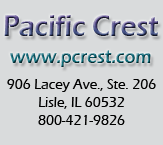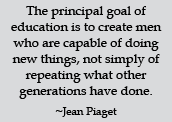We’d like to offer up a new holistic
rubric for an “Engaged Learner.” This is a recent innovation, though
we’ve been using various aspects of it for years. Forgive the length;
we’d like to share the definition we arrived at, as well as the
dimensions of performance we identified. Following that is the rubric
itself.


|
A
|
Strong self-efficacy: |
Belief in one’s own
ability and knowledge as a learner |
|
A
|
Self-starter: |
Takes initiative
with each experience to maximize their learning |
|
B
|
Being Curious: |
Constantly seeks new
knowledge in multiple forms |
|
B
|
Thinks critically: |
Asks critical
questions, analyzes information, and synthesizes meaning to
elevate understanding |
|
C
|
Active listener: |
Assesses the
perspective of the speaker, extracts the essence of the message,
records critical information, and uses perception checking to
determine accuracy |
|
C
|
Collaborative: |
Partners with
others, performs role effectively, asks for help when needed,
and assists others |
|
D
|
Being Prepared: |
Understands
expectations, collects and organizes resources, reads for
meaning, and has a plan for learning |
|
D
|
Resilient/Risk-taker: |
Seeks out
challenging learning opportunities, positively responds to
learning challenges by others, learns from temporary failures,
and continues until successful completion |
|
E
|
Contextualizes Knowledge: |
Applies
understanding to immediate context, takes time to extend to
multiple contexts, strives to put knowledge into someone else’s
context, and generalizes the knowledge to any context |
|
E
|
Self-assessor: |
Processes
self-assessment while learning and validates the learning for
each level of knowledge |

|
Pioneer Learners
-
Have strong belief in who they are and take
every opportunity to expand their knowledge and
its effective use.
-
Want to know everything about everything
(including the unknown) and use all forms of
thinking to produce high levels of
understanding.
-
Accurately understand what others are saying and
use this understanding to elevate the
performance of self and others.
-
Always know what is required to produce peak
performance and are unafraid to create or take
on any learning challenge.
-
Readily transfer new knowledge to a variety of
contexts through ongoing self-assessment in
order to elevate performance in all aspects of
life.
|
|
Professional Learners
-
Are motivated to stay on top of their discipline
and/or daily responsibilities by exploring new
concepts and tools that can ultimately be
applied.
-
Want to know everything in the areas in which
they interface and continue thinking until
complete understanding is achieved.
-
Use others to gain critical information and
through timely interactions produce learning
valued by everyone.
-
Are aware of what is needed for each performance
and looks for opportunities to advance through
taking on significant challenges
-
Make sure that they know how to transfer
knowledge by generalizing and seeks to improve
learning performance.
|
|
Contained Learners
-
Believe in what they can do and what they
currently know and initiate activities and
learning in areas of the familiar and
comfortable.
-
Seek out new information to be experts in
current context and do the inquiry, analysis and
synthesis to put meaning to this new
information.
-
Actively understand what is said by those around
them and will work with them effectively to
improve the local learning and performances.
-
Ready themselves within cultural expectations
and take risks perceived realistic for the
environment.
-
Effectively use their knowledge extension in
current context and self-assess somewhat
regularly in order to improve learning.
|
|
Needs-Based Learners
-
Believe that they can do “the basics” and take
initiative only when it is necessary for
obtaining something important to them.
-
Can find the critical information applied to
immediate concerns by using more fundamental
thinking skills.
-
Will listen to individuals that help in the
current context and interact when they perceive
an advantage in doing so.
-
Will do some preparation especially when it is
clearly beneficial, and only selectively accept
learning challenges.
-
Reserve the use of knowledge to its basic use
and self-assess only when challenged by others.
|
|
Survival Learners
-
Have a minimal level of belief in themselves and
their knowledge and rarely initiate their own
learning.
-
Seek and use information for protecting what
they have by bringing meaning for immediate use.
-
Normally hear what they want to hear and only
work with people they really trust.
-
Ready themselves only right before crisis
situations and limit the taking of risks to
situations where success is probable or
necessary.
-
Expand current knowledge for immediate use and
occasionally reflect when it is essential.
|
|
| |





